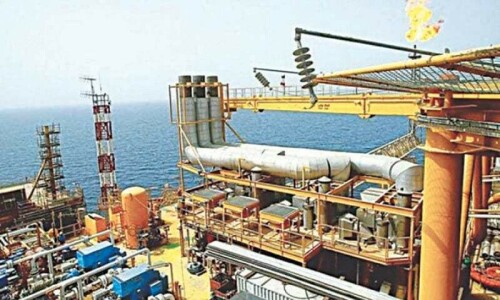ISLAMABAD: The National Accountability Bureau (NAB) on Wednesday sought to challenge the acquittal of former prime minister Nawaz Sharif in the Flagship Investment reference and request the Islamabad High Court to increase his sentence in the Al-Azizia/Hill Metal Establishment reference twofold.
Sardar Muzaffar Ahmed Khan Abbasi, the head of prosecution in the references against Mr Sharif, filed the appeals against the orders of accountability judge Mohammad Arshad Malik before the IHC.
However, IHC assistant registrar Shahid Olakh declined to accept the appeals since these were filed after the closing time of the court offices.
According to the registrar office, NAB may file the appeals again on Thursday during office hours.
On the other hand, Mr Sharif through his lawyer Khawaja Haris Ahmed challenged the Al-Azizia reference verdict in the IHC, requesting the court to set aside his conviction.
In the appeal against Mr Sharif’s acquittal in the Flagship Investment reference, NAB has claimed that accountability judge Malik “acquitted the accused [Mr Sharif] from the charge without proper appreciation of the prosecution evidence and the same is unwarranted, based on misreading and non-reading of cogent evidence, against the facts and legal justification and is liable to be set aside”.
As per the charge sheet, the former premier allegedly “injected an amount of GBP3.2 million” in Flagship and other UK-based companies of his son Hassan Nawaz. It accused Mr Sharif of “accumulation of the above said assets” in the names of his children.
The appeal states that the court had noted that Mr Sharif had been holding high-profile portfolios since 1985 and was the most influential person of his monolithic and tightly connected family. “The accused is the father of the benamidar accused(s) instrumental in establishing the companies and provided working capital amounting to GBP3.2 million to these companies.”
According to the appeal, “This fact duly establishes the factum that the working capital mentioned in the charge is provided to the absconding accused [Hussain and Hassan Nawaz]. This finding coupled with the observations in the impugned judgement negates the presumption of innocence and is sufficient to convict the accused.”
It claims: “The prosecution has shifted the initial burden cast by law upon the prosecution but the accused has not tendered any evidence to account for these assets or rebut the evidence of the prosecution.”
The appeal says: “The prosecution has brought on record the known sources of income of accused and the sources of income for acquiring these assets cited by the co-accused and endorsed by accused person which has not been appreciated by the learned accountability court.
“In these facts and circumstances available on record, the benefit cannot be extended, rather it was for the accused to account for the assets.”
Accountability court judge Malik in the Flagship reference acquitted Mr Sharif of the charges and declared, “Whilst the possibility of the accused no. 1 [Nawaz Sharif] being the real beneficial owner of the assets referred to in the charge cannot be ruled out…the court is inclined to extend the benefit of the doubt to the accused no. 1. As such, while giving him benefit of doubt, I do hereby acquit him of the charge as framed against him personally.”
Appeal to enhance sentence
Through another appeal against the accountability court’s order in the Al-Azizia reference, NAB has requested the IHC to enhance the sentence of Nawaz Sharif from seven to 14 years.
The accountability court had on Dec 24 convicted Mr Sharif in the Al-Azizia reference, sentenced him to seven years in prison and imposed on him Rs1.5 billion and $25 million fine, besides disqualifying him from holding a public office for 10 years.
In support of the appeal, the NAB prosecution has contended that “the prosecution produced as many as 22 prosecution witnesses who impartially and without being prejudiced proved the case to hilt and did not leave any stone unturned to establish the case of the prosecution beyond any shadow of doubt”.
It claims that the accountability judge himself admitted that “the prosecution has successfully established all the ingredients of the offence under section 9(a)(v). When it has been established on record that the prosecution has successfully proved its case beyond any shadow of doubt, the convict [Mr Sharif] was thus liable to be handed over a maximum punishment as provided under section 9(a)(v) of National Accountability Ordinance (NAO)”.
Therefore, NAB has requested “for modification of impugned judgement dated December 24, 2018 and for enhancement of sentence awarded to the convict.”
Published in Dawn, January 3rd, 2019










































Dear visitor, the comments section is undergoing an overhaul and will return soon.